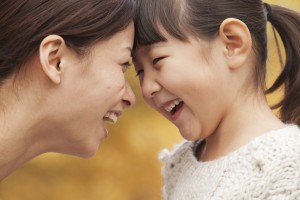
Today I watched the excellent video Selfie that is part of Dove’s #BeautyIs campaign, read a great blog post about a mom’s love for her C-Section scars, and I started thinking about how the low view a lot of people have of themselves impacts them and their children. Once I became a parent, I quickly realized that my children are learning from me from my actions and words – all. the. time. So it happened to me, what happens to a lot of people: I wanted to become a better person because I am now a mom, including in my private choices – and more specifically in my self-talk. When a parent speaks up about rejecting something in themselves, it tells their children that they should also be on the lookout to find their own flaws in order to denounce them as well. In a personal example, at the age of 42 (almost 43!) I have never rejected or felt ashamed of my age, and I believe that is due to my mother’s attitude towards her own age when I was growing up. As a little girl, I always noticed how she would start saying that she was ___ years old right at the beginning of each year, even though her birthday isn’t until mid August. Like a little kid that is proud of being older, she was always self-proclaiming her next age, never the other way around. I believe it is because I learned to love my age from her attitude towards it that I never had the desire to “stay forever” at 29 or 39, or any other age other than my current one. This is an invaluable inheritance I am excited to pass on to our 3 kids. In other areas, I did (and still do) discover self deprecating thoughts that I have continuously worked on – changing for the sake my own quality of life, as well as for our children’s. The thing about not accepting a part of yourself is that it puts you in a place where you desire a different reality, often unattainable. Statements like “I wish my nose wasn’t so big” or “my hair is horrible” or “if I could only look like ___ (insert celebrity or friend’s name)” only leads to hoping to be someone else, making joy or happiness nearly impossible. Many times, those negative perceptions are due to a distorted ‘lens’ through which we see ourselves. By proxy, parents who engage in such talk are leading their children to follow the same self-inflicting practice, perpetuating this cycle. Many times parents believe that children will only be affected if words are directed at them or if it is the children who are being talked about. Although this is one way for kids to build a their narrative, it is also true that they will learn to see and understand the world (and themselves) through the example of how their parents do it. It is the emotional equivalent to growing up exposed to toxic substances: the body and mind are forming in an environment that puts them at a deficit, something they have to always fight against, as opposed to a head start in life most parents hope to give their kids.
A better way to approach yourself and the world is to appreciate what makes you, you. Embrace your scars, your unique features, your personality traits. Help your kids learn by shifting your paradigm from judging your appearance to aspiring to always grow – while accepting who you are. If there’s opportunity for growth, then seek growth by taking actions that will take you there, but do not bad-talk yourself. If you would like to be healthier, embrace a healthier lifestyle, but do not bully yourself for (for example) ‘looking fat’. Look at yourself as you would your own child, and your words will become more loving, accepting, supporting and encouraging. Children raised by parents who practice this way of living tend to grow up looking at themselves likewise, appreciating their uniqueness and approaching their life with proactive engagement. Today, I challenge the reader and myself to scan inward and outward conversations that could be sabotaging your (and your children’s) bid for joy.
 An individual’s problems with adjustment can be more clearly understood in the context of his/her interaction with others. Because we define ourselves in relation to other people, we know the ‘sense of self’‘ is constantly being created through those interactions. This is especially true when you take into consideration that person’s patterns of connection with loved ones. When love is expressed and accepted, it is the logical antidote to the helplessness and the sense of being disconnected and betrayed, which are at the core of countless traumatic experiences. Studies (1) show that, when a spouse is included in the treatment for anxiety, rates raised from 42% of therapeutic success (in individual therapy) to almost double, at 82% of success when both spouses are involved. It is only sensible then to make the most out of this healing element in everyone’s life (relationships) and use it as part of the treatment of trauma.
An individual’s problems with adjustment can be more clearly understood in the context of his/her interaction with others. Because we define ourselves in relation to other people, we know the ‘sense of self’‘ is constantly being created through those interactions. This is especially true when you take into consideration that person’s patterns of connection with loved ones. When love is expressed and accepted, it is the logical antidote to the helplessness and the sense of being disconnected and betrayed, which are at the core of countless traumatic experiences. Studies (1) show that, when a spouse is included in the treatment for anxiety, rates raised from 42% of therapeutic success (in individual therapy) to almost double, at 82% of success when both spouses are involved. It is only sensible then to make the most out of this healing element in everyone’s life (relationships) and use it as part of the treatment of trauma.

